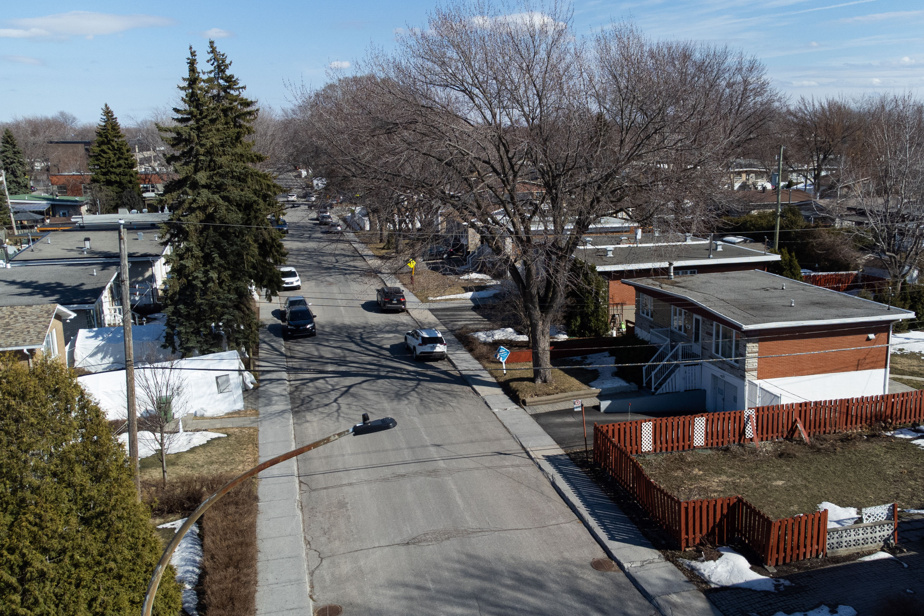Resales, home prices, housing starts, rental vacancy rates, everything will drop in the Montreal area this year, except rents, which will jump 30% over the next three years.
There is a growing imbalance between population growth, which is fueling demand for housing, and a sharp drop in housing starts, which is limiting the increase in supply.
The average rent for a two-bedroom unit will rise from $1,022 in 2022 to $1,120 this year, a hefty increase of 9.6%, according to projections by the Canada Mortgage and Housing Corporation (CMHC). unveiled Thursday. No calm is in sight. The average rent will continue its momentum to reach $1,230 in 2024, then $1,330 in 2025.
The vacancy rate, which stood at 3% in 2021, will continue to slide. From 2% in 2022, it will drop to 1.6% this year before stabilizing at 1.4% in 2024 and 2025.
These projections are taken from the most recent edition of the Housing Market Outlook, an annual report providing an overview of the market for Canada and 18 major urban centers and forecasts to the end of 2025.
Forecasts that suggest tears and gnashing of teeth among tenants who will have to find housing in the Montreal area over the next 30 months.
“In rental housing, unfortunately, we anticipate a deterioration in affordability,” says Francis Cortellino, senior specialist, Montreal market knowledge at CMHC. “It’s not cheerful,” he continued. As for new construction, we anticipate a significant slowdown in housing starts. Again, nothing good to close the gap in the lack of supply. From an affordability perspective, there will still be big challenges in the coming years. »
Housing starts decline drastically in the Montreal area in 2023. “After three months, the pace of new construction numbers is below our worst-case scenario,” notes Mr. Cortellino. In the worst-case scenario, CMHC predicted 18,000 housing starts in 2023. After the first three months of the year, the pace is more like 12,000. The pre-pandemic pace was 25,000 new units per year. To restore a balance in the market, the CMHC has calculated that the pace of housing starts must be doubled compared to that observed in recent years.
For Martin Messier, president of the Association of Quebec Landlords, governments must learn from this.
“What we see in this report, he says, is that it will take encouragement from real estate investors. When you look at a city like Montreal, there is a lot of congestion, costs and red tape: the bylaw on diversity [to promote the construction of social and affordable housing], the Responsible Owner certification and the establishment of a rental register. In Quebec, we want to study clause F of the lease, the one that allows the owner of a dwelling less than five years old to adjust his rent annually [without constraint]. Now is not the time. »
As for the resale market, the year 2023 will be in two stages: a marked slowdown in resales, then, from the second half of the year, a recovery in transactions.
“Since the peak in April 2022, prices are down 10% so far,” Cortellino says over the phone. It stabilizes in the middle of the year. In the second part of 2023, it starts to slowly increase again. On average, CMHC forecasts a price drop of 5% in 2023.
For buyers who are waiting for the price drop to acquire a property, the window will soon close.
“Over the 2024-2025 horizon, under the effect of a recovery in sales, prices will resume a slight upward trend. On the other hand, it is not expected that this price growth will be similar to that which marked the pandemic period,” reads the CMHC report. The organization expects interest rates to fall starting in 2024.
“There is a lot of truth in the CMHC report, but in my opinion it will remain difficult throughout 2023, as long as there is no interest rate cut”, says Annie Lemieux , president of LSR GesDev, who agreed to comment on the CMHC forecast.
LSR is building the Novia rental apartments at the Longueuil metro. The schedule is respected and the rental of the units is ahead of the forecasts, but the financing costs turn out to be higher than the budget forecasts. “Banks are reluctant to finance if CMHC doesn’t insure the loan,” says Lemieux in this trying time for real estate developers. Recently, Groupe Sélection, of Laval, and Groupe Huot, of Quebec City, have experienced serious financial problems.
A sharp decline in housing starts is expected in 2023 due to rising financing costs. A regional peculiarity, the price of properties will increase this year, even if sales will decrease. The rental market will remain under pressure in 2023, as supply is insufficient to keep up with demand. This situation will increase rents by 8% in three years, much less than in Montreal.
Demand for properties is expected to decline due to high mortgage rates and slower job growth in 2023. Prices have also been falling for a few months. Despite the rise in interest rates, the total number of housing starts in 2023 should remain historically high in this region. The rental vacancy rate will remain low at least until 2023.
“The decline in Canadian home prices, from their historic pandemic highs, is expected to end in mid-2023, but the average price for the year will be lower than in 2022. Prices will then rise,” argues CMHC in its report. The average price will fall by 8.6% in 2023, then increase by 7.9% in 2024 and 7.5% in 2025.
